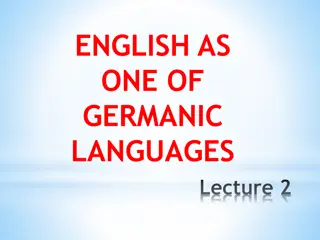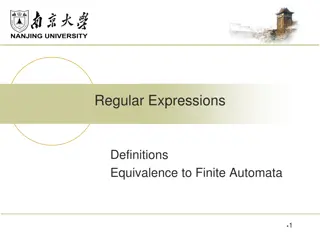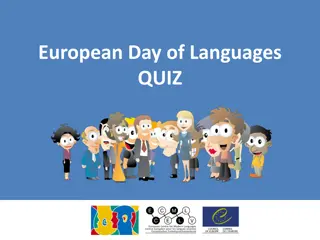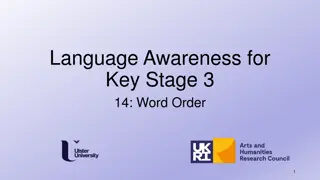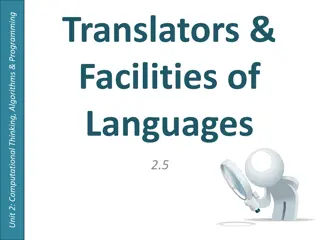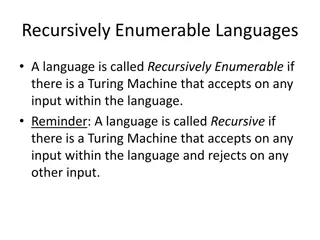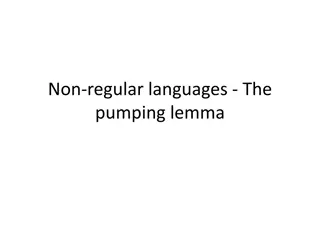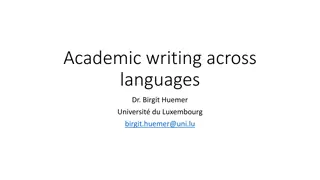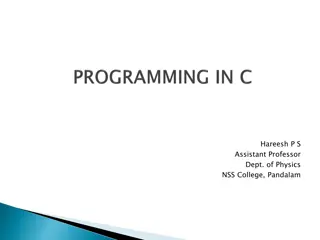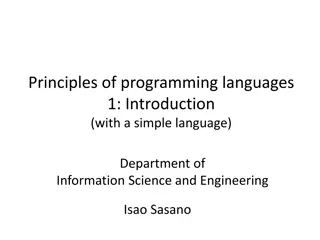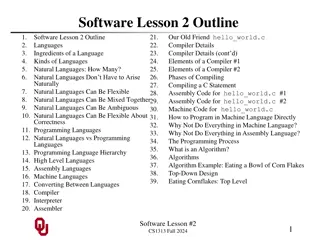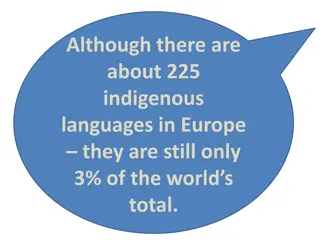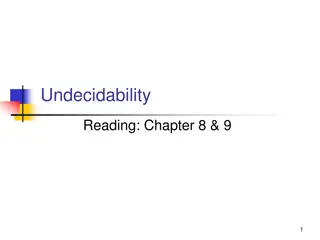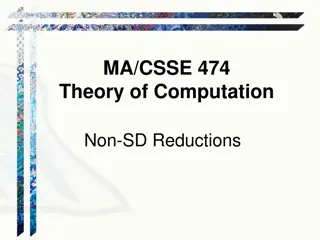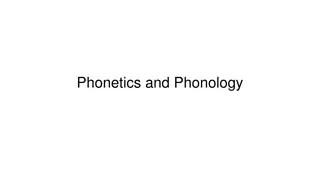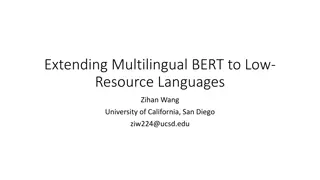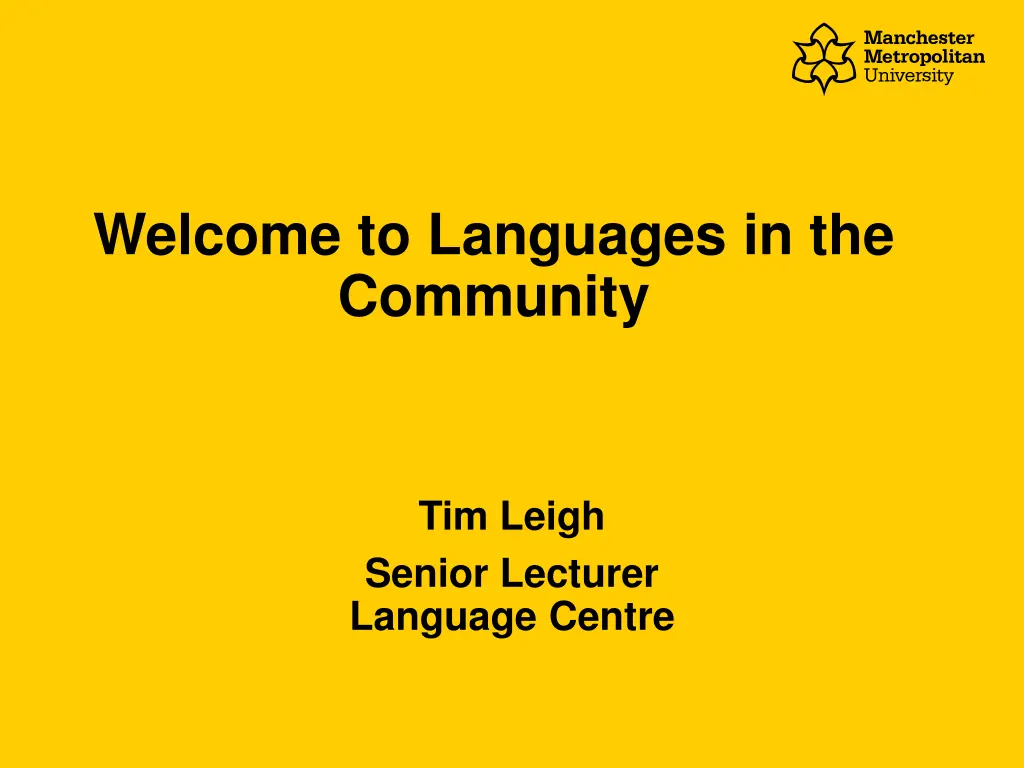
Explore Languages in the Community Workshop - Tim Leigh Senior Lecturer Language Centre
Join the Languages in the Community Workshop led by Tim Leigh at the Language Centre. Discover topics on multilingualism, language, culture, identity, communication, and more. Engage in self-study, attend weekly workshops, and interact with fellow learners to enhance your understanding. Dive into Urdu, Arabic, Mandarin Chinese, Bengali, Polish, and Punjabi languages while exploring the diverse community of Manchester. Get ready to expand your linguistic horizons!
Download Presentation

Please find below an Image/Link to download the presentation.
The content on the website is provided AS IS for your information and personal use only. It may not be sold, licensed, or shared on other websites without obtaining consent from the author. If you encounter any issues during the download, it is possible that the publisher has removed the file from their server.
You are allowed to download the files provided on this website for personal or commercial use, subject to the condition that they are used lawfully. All files are the property of their respective owners.
The content on the website is provided AS IS for your information and personal use only. It may not be sold, licensed, or shared on other websites without obtaining consent from the author.
E N D
Presentation Transcript
Welcome to Languages in the Community Tim Leigh Senior Lecturer Language Centre
The team M ir Bull Programme Co-Lead mair.bull@mmu.ac.uk Ahmad Al Shahma Unit Support ahmad.al-shahma@stu.mmu.ac.uk Tim Leigh Unit Leader T.Leigh@mmu.ac.uk
Todays learning objectives : To introduce the unit of study and each other. To gain familiarity with the unit s content and delivery. To better understand the University s support mechanisms. To taste the week 1 language: Urdu.
What do you think we will study over the next 6 weeks? Languages in the Community If community , which languages do you think we will focus on? Manchester is the To have another language is to possess a second soul Do you agree? Why/Why not?
Languages in the Community Weeks Content Language Workshop Week 1 (25/1) Multilingualism Urdu Tim / Momna Week 2 (1/2) Language & Culture Arabic Ahmad Week 3 (8/2) Language & Identity Mandarin Chinese Karen / Shuwen Week 4 (15/2) Communication Bengali Tim / Liz Week 5 (22/2) Miscommunication Polish Tim / Tony Week 6 (1/3) Language as a gatekeeper Punjabi Ahmad / Maham Week 7 (8/3) Optional online drop in (assessment support) Week 8 (15/3) Optional online drop in (assessment support) Week 9 (22/3) Assessment deadline
Each week, your goal is to: Complete the 5 hours of self-study on the RISE platform. Attend the 2-hour Wednesday evening workshop. Be prepared to discuss and share your ideas both individually and in groups. Double homework if you haven t had a look at week 1. You will need to complete week 2 for next Wednesday.
A little about you What made you choose to join the course? What are you most looking forward to studying? What are you not looking forward to? What is your background in learning other languages?
Manchester: City of languages Approximately how many languages do you think are spoken by long-term residents in the Greater Manchester area? 50 100 150 200
Manchester: City of languages What percentage of Manchester s adult population are likely to be multilingual? 10% 20% 70% 50%
Manchester: City of languages Manchester s language diversity is one of its greatest strengths . Do you agree?
Manchester: City of languages Which language is the most popular community language in Greater Manchester? Mandarin Chinese Punjabi Urdu Polish
How do we greet in urdu? -Asalamualikum [as-alam-o-ali-kum], is how we say Hi, this translates to may peace be upon you -In reply to Asalamualikum we say Walaikumasalam, which means may peace me upon you too -Or we can simply say Salam .
How deo we introduce ourselves? -I m Momna so I would say Mera naam Momna hai which translates to my name is Momna. - Apsay milkay acha laga which means nice to meet you.
Howre you? Apka kya haal hai? I m fine, thank you, and you? Mai theek hun, aur aap Goodbye Alvida
Lets practise some urdu Asalamualikum Walaikum asalam Apka kya haal hai? (How re you?) Mera naam _____ hai. (My name is_____) Alvida (Goodbye)
Facts about urdu Urdu is spoken by 87 million people around the world 4 million people in the UK speak Urdu There are many words in Urdu which are the same in English such as: sofa, cup, juice, calendar, machine, pyjamas etc The word Thanks in English translates to Shukriya in Urdu, but unlike British/English people, Urdu speaking people don t use it much, not because they are being rude but just because it s uncommon
Alphabet in urdu -Written Urdu has two versions, Roman Urdu, and Urdu. Roman Urdu is written with the Latin script and traditional Urdu is written in Arabic script, Urdu and Arabic share the same alphabet. -Traditional Urdu just like Arabic starts from right to left whereas roman Urdu is read and written just like English which is from left to right.
Key Terms and Definitions Bilingual Can speak two languages (fluently) Multilingual Can speak more than two languages (fluently) Code switching When a person switches languages or language varieties in speech (or text) Fluent possesses a high level of language (speaks naturally) EAL English as an Additional Language ESOL English for Speakers of Other Languages EFL English as a Foreign Language Native language / mother tongue / first language A person s first language Language grading Changing your language to suit the listener/reader, e.g. simplifying language Accent a person s pronunciation Dialect a person s language (or language variety), e.g. vocabulary choice, grammar, etc.

